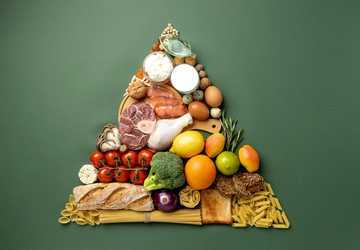fashion
In today's fast-paced world, it's no surprise that we often run low on energy. While a good night's sleep and regular exercise play vital roles in maintaining our energy, one often overlooked factor is our diet. Yes, what you eat can significantly impact your energy levels.
Designing a balanced diet for optimal energy isn't just about the right foods; it's about understanding how to fuel your body effectively. In this article, we'll explore the components of a balanced diet, the science behind it, and practical tips to help you stay energized throughout the day.

The Basics of a Balanced Diet
To understand how to design a balanced diet for optimal energy, it's crucial to know the fundamental components of such a diet:
1. Macronutrients: Macronutrients are the essential nutrients that provide calories, serving as the fuel your body needs for energy. The three primary macronutrients are carbohydrates, proteins, and fats. Carbohydrates are your body's preferred energy source, broken down into glucose, which fuels your cells.
Proteins are crucial for body tissue growth and repair and vital to enzyme function and hormonal balance. Healthy fats are indispensable for energy storage, insulation, and overall well-being.
2. Micronutrients: These vitamins and minerals are needed in smaller quantities but are vital for various bodily functions. A deficiency in micronutrients can lead to fatigue and decreased energy levels. Ensure you get a variety of fruits and vegetables to cover a broad spectrum of micronutrients.
3. Hydration: Staying properly hydrated is crucial for maintaining energy levels. Dehydration can lead to feelings of fatigue, so drink enough water throughout the day.
The Science Behind Energy
Understanding the science behind energy is essential for making informed choices when crafting a balanced diet. Our body's primary energy source is the food we consume, particularly the macronutrients. To simplify, here's how it all works: Carbohydrates are converted into glucose, a form of sugar, as you eat them. This glucose enters your bloodstream, causing a rise in blood sugar levels.
Subsequently, your pancreas releases insulin to aid cells in absorbing the glucose for energy. As your cells utilize this glucose, your blood sugar levels return to normal, providing sustained energy. Though not the primary energy source, proteins are vital in sustaining your energy levels by facilitating tissue repair and muscle development. Fats, especially healthy ones, serve as a long-lasting energy reservoir.
Designing Your Balanced Diet for Optimal Energy

Prioritize Complex Carbohydrates: Make complex carbohydrates a significant part of your diet. Foods like whole grains (brown rice, quinoa, whole wheat bread), fruits, and vegetables should be your primary energy sources. These carbohydrates release glucose slowly into your bloodstream, providing a steady energy source.
Include Lean Proteins: Incorporate lean proteins into your meals to support muscle growth and repair. Choose sources like skinless poultry, lean cuts of meat, fish, tofu, and legumes. They'll keep you feeling full and energized.
Embrace Healthy Fats: Include healthy fats in your diet for a sustained energy source. Avocados, nuts, seeds, and olive oil are excellent choices. Avoid trans fats and limit saturated fats to keep your energy levels stable.
Stay Hydrated: Dehydration can lead to a significant drop in energy levels. Ensure you're drinking enough water throughout the day. Herbal teas and infusions can also help maintain hydration while adding a variety of flavors to your routine.
Balance Your Meals: Aim for balanced meals with a mix of macronutrients. For example, a meal could consist of grilled chicken (protein), quinoa (carbohydrates), and a side of sautéed vegetables (micronutrients and fiber). This combination ensures you're getting a steady release of energy while meeting your nutritional needs.
Snack Wisely: Healthy snacks can help keep your energy levels stable between meals. Opt for options like yogurt, fruit, nuts, or whole-grain crackers. Avoid sugary snacks and empty-calorie foods that cause energy spikes and crashes.
Listen to Your Body: Pay attention to your body's signals. If you're feeling hungry, it's a sign that your energy levels are dropping. Avoid skipping meals, as this can lead to low energy and overeating later in the day.
Limit Caffeine and Sugar: While caffeine and sugar can provide a quick energy boost, they often lead to crashes shortly afterward. Moderation is key. Opt for green tea or black coffee without excessive sugar if you need a caffeine fix.
Meal Planning and Preparation
Now that you know the basics of a balanced diet for optimal energy, let's discuss meal planning and preparation. The key to success lies in organization and setting yourself up for dietary success.
Plan Your Meals: Take some time each week to plan your meals. Consider your schedule and the nutritional requirements of your day. This will help you avoid reaching for unhealthy options when pressed for time.
Grocery Shopping: Stick to your meal plan at the grocery store. Avoid buying foods high in sugar, unhealthy fats, or processed ingredients. Focus on fresh produce, lean proteins, and whole grains.
Cook in Batches: Preparing meals in batches can save you time during the week. Cook enough for a few meals and store the rest in the refrigerator or freezer for later. This can be a real time-saver on busy days.
Healthy Snacking: Keep healthy snacks readily available so less nutritious options do not tempt you. Fill your pantry with nuts, seeds, whole-grain crackers, and cut-up veggies.
Mindful Eating: When it comes to mealtimes, practice mindful eating. Sit down, savor your food, and eat slowly. This will help you recognize when you're full, preventing overeating and energy crashes.
Conclusion
Designing a balanced diet for optimal energy isn't just about what you eat; it's a holistic approach to your overall well-being. Pay attention to how different foods affect your energy levels and adjust accordingly.
Incorporate these dietary principles into your lifestyle gradually, and you'll soon notice an increase in your energy levels and overall well-being. Your optimal energy levels are within your reach, and they're waiting for you to unlock them through the power of balanced nutrition.

